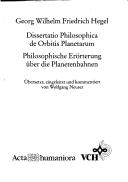| Listing 1 - 8 of 8 |
Sort by
|
Dissertation
Year: 1854 Publisher: Lundae : Berling,
Abstract | Keywords | Export | Availability | Bookmark
 Loading...
Loading...Choose an application
- Reference Manager
- EndNote
- RefWorks (Direct export to RefWorks)
Book
Year: 1761 Publisher: Avgvstae Vindelicorvm : Sumtibus Eberhardi Klett Viduae,
Abstract | Keywords | Export | Availability | Bookmark
 Loading...
Loading...Choose an application
- Reference Manager
- EndNote
- RefWorks (Direct export to RefWorks)
Book
ISBN: 0511841701 Year: 2011 Publisher: Cambridge : Cambridge University Press,
Abstract | Keywords | Export | Availability | Bookmark
 Loading...
Loading...Choose an application
- Reference Manager
- EndNote
- RefWorks (Direct export to RefWorks)
Described by one reviewer as 'one of the most perfect books ever written on theoretical astronomy', this work in Latin by the German mathematician Carl Friedrich Gauss (1777-1855), the 'Prince of Mathematicians', derived from his attempt to solve an astronomical puzzle: where in the heavens would the dwarf planet Ceres, first sighted in 1801, reappear? Gauss' predicted position was correct to within half a degree, and this led him to develop a streamlined and sophisticated method of calculating the effect of the larger planets and the sun on the orbits of planetoids, which he published in 1809. As well as providing a tool for astronomers, Gauss' method also offered a way of reducing inaccuracy of calculations arising from measurement error; the primacy of this discovery was however disputed between him and the French mathematician Legendre, whose Essai sur la théorie des nombres is also reissued in this series.
Book
Year: 1744 Publisher: Berolini : sumtibus Ambrosii Haude,
Abstract | Keywords | Export | Availability | Bookmark
 Loading...
Loading...Choose an application
- Reference Manager
- EndNote
- RefWorks (Direct export to RefWorks)
Orbits. --- Astronomy --- Comets --- Early works to 1800.

ISBN: 3527175474 9783527175475 Year: 1986 Volume: 2 Publisher: Weinheim VCH
Abstract | Keywords | Export | Availability | Bookmark
 Loading...
Loading...Choose an application
- Reference Manager
- EndNote
- RefWorks (Direct export to RefWorks)
Planets --- Astronomy --- Planètes --- Astronomie --- Orbits. --- Philosophy --- Orbites --- Philosophie --- Planètes
Book
Year: 1760 Publisher: Petropoli : Typis Academiae Scientiarvm,
Abstract | Keywords | Export | Availability | Bookmark
 Loading...
Loading...Choose an application
- Reference Manager
- EndNote
- RefWorks (Direct export to RefWorks)
Astronomy --- Planets --- Early works to 1800. --- Orbits --- Venus (Planet)
Book
ISBN: 9783787340446 9783787340453 3787340440 Year: 2022 Publisher: Hamburg Felix Meiner Verlag
Abstract | Keywords | Export | Availability | Bookmark
 Loading...
Loading...Choose an application
- Reference Manager
- EndNote
- RefWorks (Direct export to RefWorks)
Philosophy of nature --- Planets --- Astronomy --- Physics --- Orbits. --- Philosophy --- Hegel, Georg Wilhelm Friedrich,
Book
Year: 1809 Publisher: Hamburgi : sumptibus Frid. Perthes et I. H. Besser,
Abstract | Keywords | Export | Availability | Bookmark
 Loading...
Loading...Choose an application
- Reference Manager
- EndNote
- RefWorks (Direct export to RefWorks)
Orbits. --- Astronomy --- Early works to 1900. --- Solar system --- Motion in space.
| Listing 1 - 8 of 8 |
Sort by
|

 Search
Search Feedback
Feedback About UniCat
About UniCat  Help
Help News
News